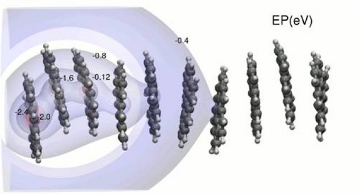Charge migration is a ubiquitous phenomenon with profound implications throughout many areas of chemistry, physics, biology and materials science. The long-term vision of designing functional materials with tailored molecular scale properties has triggered an increasing quest to identify prototypical systems where truly molecular conduction pathways play a fundamental role. Such pathways can be formed due to the molecular organization of various organic materials and are widely used to discuss electronic properties at the nanometer scale. Here, we present a computational methodology to study charge propagation in organic molecular stacks at nano and sub-nanoscales and exploit this methodology to demonstrate that moving charge carriers strongly affect the values of the physical quantities controlling their motion. The approach is also expected to find broad application in the field of charge migration in soft matter systems.

Charge migration is a ubiquitous phenomenon with profound implications throughout many areas of chemistry, physics, biology and materials science. The long-term vision of designing functional materials with tailored molecular scale properties has triggered an increasing quest to identify prototypical systems where truly molecular conduction pathways play a fundamental role. Such pathways can be formed due to the molecular organization of various organic materials and are widely used to discuss electronic properties at the nanometer scale. Here, we present a computational methodology to study charge propagation in organic molecular stacks at nano and sub-nanoscales and exploit this methodology to demonstrate that moving charge carriers strongly affect the values of the physical quantities controlling their motion. The approach is also expected to find broad application in the field of charge migration in soft matter systems.
